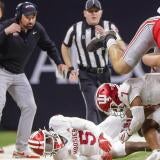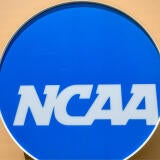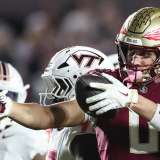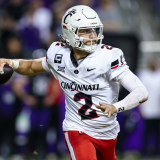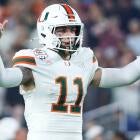Rose Bowl culture war: Can Oklahoma win it all by simply breaking scoreboards?
The Sooners' top-ranked offense goes up against the Dawgs' top-five defense in a true Big 12-SEC battle
LOS ANGELES -- The week of Nov. 5 is when the Big 12 lost control of the national conversation. It wasn't the first time.
The Big 12's best team, Oklahoma, had just played one of its best games, beating then-No. 11 Oklahoma State 62-52.
Except that wasn't the story no matter what you read, saw or heard in the national media. The narrative contained words like "pinball" and "shootout" along with references to basketball scores.
The knee jerks who spouted this tripe were both lazy … and accurate. The Big 12 sometimes masquerades as a rec league where defense is optional.
"We get the narrative," said Orlando Brown, Oklahoma's All-American left tackle. "We understand what it is."
To be in the College Football Playoff, you must understand who you are and what you're about. Georgia is a proud, upstanding member of the Old South's oldest sport in its most successful conference. Oklahoma? Sometimes it has to apologize for itself and the league in which it plays.
That is to say this Rose Bowl semifinal is a football culture war. Georgia is the embodiment of the SEC culture.
"You're bruised up each and every week," Georgia linebacker Roquan Smith said. "… Everything in life, I just feel like if you want something, you have to really work for it."
Oklahoma's culture is the same as that of the Big 12. In any given week, it may have to score 62 to win.
One culture is to break the will of the opponent. The other -- at times -- is to break scoreboards.
That leads us to one of the leading storylines of this playoff: There are no analytics on such things, exactly, but Oklahoma could become the first team to score its way to a national championship.
Seven times this season, the Sooners have given up at least 24 points. The average score of its games is 45-25. If the numbers hold, OU would have the second-worst defense to win a national championship in the last 15 years.
"As a team, it's hard to hear that," Brown said, "because those guys that play defense are my brothers. So, man, it's obviously hard hearing that narrative."
Defense wins championships? Of course. Usually. Thirteen of the last 14 national champions have sported a top 20 defense. Twelve of those have finished in the top 10.
Oklahoma comes into the Rose Bowl ranked 59th in total defense. The only national champion worse in the last 15 years was Auburn (60th in 2010). But that unit progressed and improved tremendously late in the season, eventually limiting Oregon -- the nation's highest scoring team -- to 19 points in the BCS Championship Game.
Can Oklahoma's defense win a championship? Let's just say that's not the first thought that comes to mind. OU defensive coordinator Mike Stoops summed up his weekly predicament playing in the conference.
"We may hold [an opponent] 200 yards underneath their average and that still might be [Oklahoma giving up] 400 yards."
And that, it should be pointed out, is a good day.
This Big 12 culture doesn't defend itself very well. When the ACC Network debuts in 2019, the Big 12 will be the only Power Five league without a network.
Where is the narrative about OU going four games without a turnover? That's the longest streak in school history. What about the pro potential of All-America linebacker Ogobonnia Okoronkwo? What about being in the freakin' playoff for the second time in three years?
The week of that Oklahoma State win, while there was growing confidence in Norman, talking heads all over the country were practicing their own versions of ridiculousness.
In other words, Oklahoma -- and its league -- weren't worthy in their eyes.
You didn't hear it then, but that game marked the 10th time under Lincoln Riley that the Sooners had scored at least 56 points -- or that their defense actually did make some key stops in the fourth quarter to turn the game.
"The small picture was we won. The big picture we didn't play very well and gave up way too many big balls," OU defensive coordinator Mike Stoops said. "We got out of sorts and kind of lost a little bit of our identity."
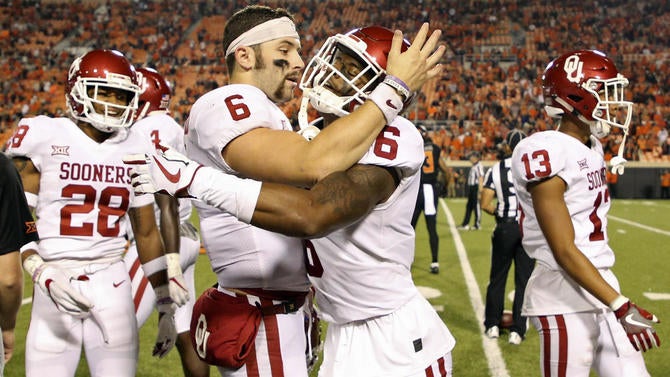
We know Oklahoma's identity starts with star quarterback Baker Mayfield and the nation's No. 1 offense. Georgia, with the No. 4 defense, knows it has to stop the Heisman Trophy winner if it has a chance.
But that's easier said than done, which is what makes this matchup so juicy. Oklahoma hasn't played a defense this good all season -- and that includes the Week 2 upset at Ohio State. Georgia, of course, hasn't played an offense this good either.
It's hard to imagine Oklahoma beating Georgia by that average score, 45-25, the same way you can't imagine the Bulldogs beating the Sooners 28-7. That's the same score Georgia beat Auburn by in the SEC Championship Game.
That forces us to make a value judgment on which culture is better.
"I wouldn't go there," Oklahoma co-offensive coordinator Cale Gundy said.
The SEC ultimately wins because of history. It was pounding the ball and playing defense long before Bear Bryant was leaning against a goalpost toking on a Marlboro in pregame.
"It's a run-heavy physical kind of downhill conference," Georgia tight end Jeb Blazevich said. "We take great pride in it. I came to Georgia to play in the SEC just for the atmosphere, the stadium, the opponents."
Not to mention the SEC having scoreboard. It has won eight national championships in the last 11 years. And for the first time, the SEC has two teams (Georgia, Alabama) in the CFP field.
"We're Oklahoma," Stoops said. "We should be able to match up with anybody."
Even Georgia isn't the cream of its own conference. OU is the Big 12's flagship program, having won 11 conference titles in the last 19 years. Former Sooners coach Bob Stoops shaped the culture when he hired Mike Leach away from Kentucky in 1998.
That's where the two conferences intertwined. Bob Stoops had gone against Hal Mumme's Kentucky teams for two years while Florida's defensive coordinator.
"My reasoning was Kentucky led the league in yards, first downs, possessions, third down conversions -- and they're in the SEC," Bob Stoops said. "I thought, 'If they can do that there, why can't we do that here?' It gave me instant quarterback credibility."
Mayfield is Oklahoma's third Heisman-winning quarterback since 2003. Only one other conference (SEC) has equaled that number in that span.
The last time we saw something like this out of the Big 12 in a championship setting was both 2008 and 2009.
Oklahoma and Heisman-winning QB Sam Bradford were stuffed by Florida in the 2009 BCS Championship Game. But that was without star running back DeMarco Murray, who did not play, hurting an offense that scored a then-record 716 points.
Five plays into the 2010 BCS Championship Game at the Rose Bowl, Texas' Heisman runner-up in QB Colt McCoy went down with an injured throwing arm against Alabama. The Longhorns never had a chance after that, losing 37-21.
The Big 12 hasn't been back to a title game since, but it hasn't been out of the running. The Big 12 has never had a winning decade against the SEC, but since 2015, it does lead head-to-head meetings 7-6 with a 3-1 edge in the last four bowl matchups.
Oklahoma beat Alabama 45-31 in the 2014 Sugar Bowl. Last January, the Sooners handled Auburn 35-19.
Those were culture clashes, too.
"In today's world, offense and defense together win championships," Bob Stoops said. "You don't see too many 10-9 national championship games."
Even though Leach stayed only a year at OU (1999), he installed the Air Raid offense that Stoops kept. Leach then remained in the conference with Texas Tech for a decade, averaging almost nine wins a year with an offense that every Big 12 opponent had to plan around.
"I told him, 'If we do well in two or three years, you have a chance to be a head coach,'" Stoops said of Leach. "It took nine months. After Mike left, we kept the system."
It has now come full circle. Riley -- a former Leach assistant -- was hired as offensive coordinator two years ago because OU had "strayed too far" from the Air Raid scheme, Stoops said.
The youngest FBS head coach also is one of the brightest offensive minds. Riley, 34, knows what his team has to do.
The Sooners just have to be average. That would mean dropping 45 points and 583 yards on the defensive-minded Dawgs.



